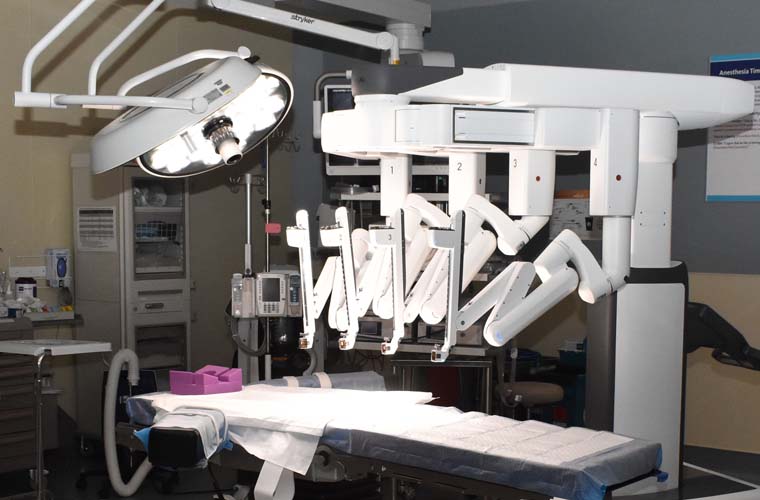Robotic Technology Offers Precision for Surgeons, Fast Recoveries for Patients

Surgical robots have come a long way since they were first introduced in the mid-1980s. Fine-tuned through decades of research and development, they now feature high-tech arms with finger-like pincers for holding surgical instruments and cameras for enhanced vision, navigation and control. In the capable hands of surgeons, today's surgical robots can help provide some of the most effective and least invasive treatments available.
“Robotic surgery has changed how we operate,” said Dr. Elizabeth Myers, a robotic fellowship-trained colorectal surgeon affiliated with St. Joseph’s Hospital and the Cancer Liaison Physician to the American College of Surgeons for St. Joseph’s Hospital’s Cancer Institute. “The technology allows us to see beautiful anatomy in three dimensions in some of the smallest spaces of the body.”
For example, robotic instrumentation allows Dr. Myers to operate deep in the pelvis with less risk for nerve injury and bleeding compared to open surgery. Her patients often go home after just a few days taking only acetaminophen and ibuprofen for pain.
“We are fortunate to have skilled robotic surgeons across multiple disciplines, which allows for complex operations to be carried out simultaneously by colorectal surgeons, gynecologic oncologists and urologists,” said Dr. Myers. “As such, we’re able to offer patients highly complex surgery in a minimally invasive fashion.”
Surgeons are known for their steady hands. But it's tough to compete with the stability of a machine. Surgical robots -- sometimes called "co-bots" -- work collaboratively with surgical teams, combining the surgeon's medical expertise with the robot's mechanical precision. This teamwork lets surgeons perform complicated tasks with superhuman dexterity.
Surgeons are always in control of surgical robots. Prior to operating these machines, BayCare surgeons complete specialized training that have equipped them with the knowledge and experience to work safely and effectively.
“Doctors that want to start doing robotic surgeries start with case observations followed by online training, including hands on experience with a simulator,” said Kristy Cahill, a certified nurse who oversees the robotic service line at Morton Plant Hospital.
Surgeons then practice hands-on training, such as operating in labs on pig tissue, which gives them a realistic feel for working with patients. Once they finish their training and earn approval to start at the hospital, surgeons are proctored by an experienced robotic surgeon before they lead their own procedure, Cahill said.
Demand for robot-assisted surgeries has risen in recent years, driven by reported benefits for patients and surgeons. Dr. Vriti Advani, a general surgeon affiliated with Winter Haven Hospital, said robotic technology helps improve the overall experience for patients and surgeons.
“Patients often experience smaller incisions, less pain and earlier recovery times with robot-assisted surgeries compared to standard open surgery,” said Dr. Advani, who has special interest in robotic surgeries for acid reflux, hernias and pancreaticobiliary procedures. “My patients often get to go home on the same day as their surgery. For surgeons, robotic technology allows for enhanced dexterity and optimizes their ability to see all the tissues in high-resolution detail.”
Robotic surgeries have become popular among athletes, geriatric patients and the general population. This treatment approach is desirable for anyone who wants to limit their hospital stay without compromising the quality of their care.
In the end, the use of a surgery robot is up to the physician. But while surgeons sometimes prefer a traditional approach for certain procedures, BayCare’s list of robotic surgery services continues to grow. BayCare hospitals offer dozens of robot-assisted procedures including colorectal, gynecological, thoracic, prostate, pediatric, urologic, bariatric and general surgeries.
Patient outcomes and experiences are of utmost importance to surgeons like Dr. Advani. That’s why she said she earned her credentials to perform robot-assisted surgeries with BayCare.
“As a surgeon who performs a wide variety of surgical procedures, robotic technology allows me to offer patients minimally invasive approaches to surgeries,” she said. “My favorite part about operating with these robots is that I have the ability to essentially operate with four hands at the same time, and control the movement of the robotic camera with my eyes and feet. It’s such an efficient way to operate and decreases operating time for my patients.”
For more information on BayCare's robotic services, visit our hospitals' web pages below.
- Bartow Regional Medical Center
- Mease Countryside Hospital
- Morton Plant Hospital
- St. Anthony's Hospital
- St. Joseph's Hospital
- St. Joseph's Children's Hospital
- St. Joseph's Women's Hospital
- South Florida Baptist Hospital
- St. Joseph's Hospital-North
- St. Joseph's Hospital-South
- Winter Haven Hospital
- Morton Plant North Bay
